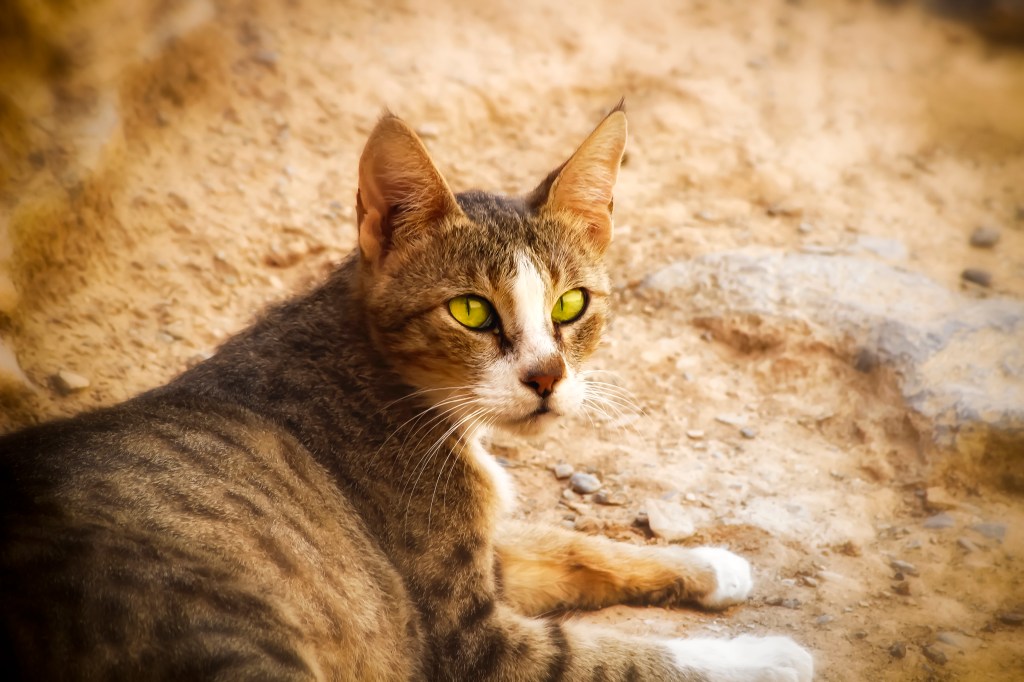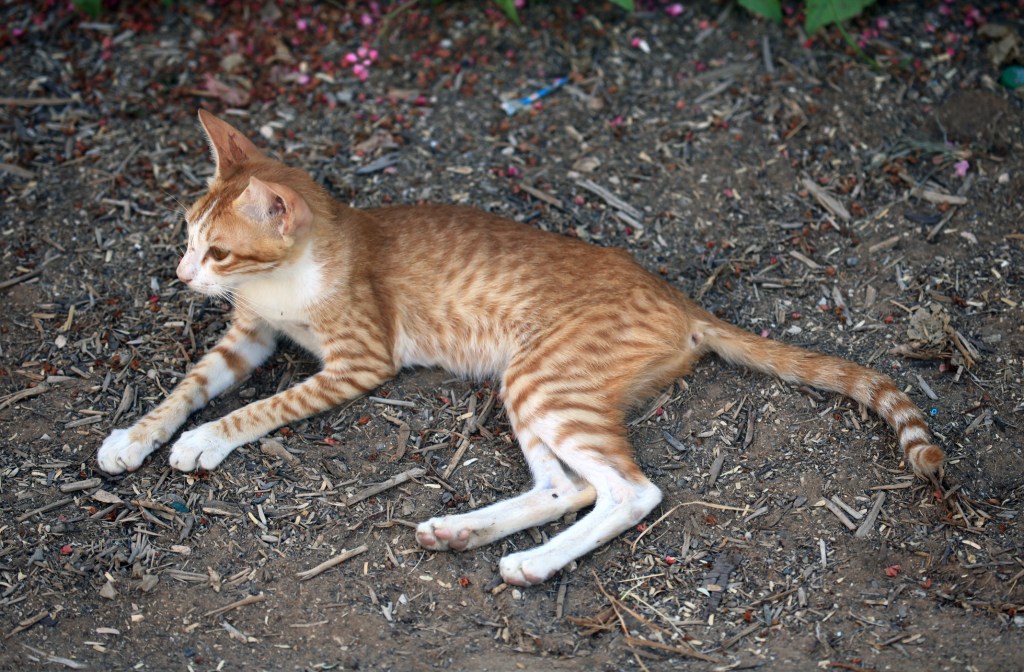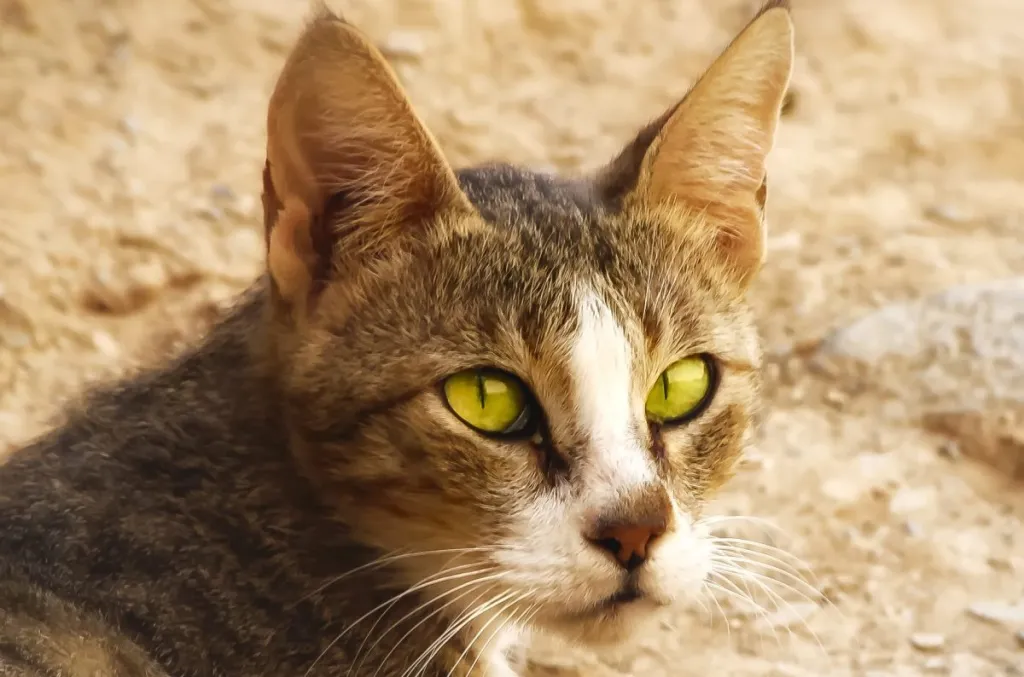The Arabian Mau is a natural cat breed cat, known for being energetic, sociable, and playful. They are one of the oldest naturally occurring feline breeds in the world. They originated from wild cats, and are well-adapted to hot weather. Only recently were breeding programs introduced to preserve the breed.
The Arabian Mau hails from the desert regions of the world. These are athletic and sporty felines who stay active and crave play sessions. They’re friendly and trusting, so they quickly bond with the humans in their life; although, they definitely demand a lot of attention. They really need to live with a family where there are always people around to interact with.
When considering an Arabian Mau cat, it’s advisable to prioritize adopting from rescue organizations or shelters to provide a loving home to a cat in need. However, if you decide to purchase an Arabian Mau kitten, it’s crucial to choose a reputable breeder. Conduct thorough research to ensure that the breeder follows ethical practices and prioritizes the well-being of their cats. Reputable Arabian Mau cat breeders prioritize the health and temperament of their cats, conduct necessary health screenings, and provide a nurturing environment for the kitties. This active approach ensures that you bring home a healthy and happy kitty while discouraging unethical breeding practices.
Quick Facts
- Origin: Arabian Peninsula
- Size: Medium (8-12 pounds)
- Breed Group: Landrace (naturally occurring breed)
- Lifespan: 12-15 years
- Coat: Short, sleek, and spotted, with a unique “ticking” pattern where each hair has multiple bands of color. Common colors include brown, silver, and black.
- Temperament: Intelligent, playful, energetic, curious, loyal, affectionate, enjoys human interaction.
- Exercise Needs: Moderate – playtime, climbing, and mental stimulation are key.
- Training: Can be trained with positive reinforcement due to their intelligence, but can also be independent.
- Grooming: Weekly brushing to maintain their sleek coat.
- Health: Generally healthy, but some potential for genetic health conditions.
- Their large ears are a result of adapting to the hot temperatures of the Arabian Peninsula. They help dissipate body heat.
- They are a very vocal breed, known for their demanding meows and chirps.
- Like the Egyptian Mau or Chinese Li-Hua Mao, the “mau” in their name means “cat.”
Arabian Mau Pictures



-
Affectionate with Family
Some cat breeds are typically independent and aloof, even if they’ve been raised by the same person since kittenhood; others bond closely to one person and are indifferent to everyone else; and some shower the whole family with affection. Breed isn’t the only factor that goes into affection levels; cats who were raised inside a home with people around feel more comfortable with humans and bond more easily.

See Cats Less Affectionate with Family -
Amount of Shedding
If you’re going to share your home with a cat, you’ll need to deal with some level of cat hair on your clothes and in your house. However, shedding does vary among the breeds. If you’re a neatnik, you’ll need to either pick a low-shedding breed or relax your standards. This furniture cover can make it easier to clean up cat hair and keep it off your sofa!
-
General Health
Due to poor breeding practices, some breeds are prone to certain genetic health problems. This doesn’t mean that every cat of that breed will develop those diseases; it just means that they’re at an increased risk. If you’re looking only for purebred cats or kittens, it’s a good idea to find out which genetic illnesses are common to the breed you’re interested in.
-
Potential for Playfulness
Some cats are perpetual kittens—full of energy and mischief—while others are more serious and sedate. Although a playful kitten sounds endearing, consider how many games of chase the mouse-toy you want to play each day, and whether you have kids or other animals who can stand in as playmates. A classic wand cat toy like this one is perfect for playful felines!
-
Tendency to Vocalize
Some breeds sound off more often than others with meows, yowls, and chattering. When choosing a breed, think about how the cat vocalizes and how often. If constant “conversation” drives you crazy, consider a kitty less likely to chat.
-
Kid-Friendly
Being tolerant of children, sturdy enough to handle the heavy-handed pets and hugs they can dish out, and having a nonchalant attitude toward running, screaming youngsters are all traits that make a kid-friendly cat. Our ratings are generalizations, and they’re not a guarantee of how any breed or individual cat will behave; cats from any breed can be good with children based on their past experiences and personality.
-
Friendly Toward Strangers
Stranger-friendly cats will greet guests with a curious glance or a playful approach; others are shy or indifferent, perhaps even hiding under furniture or skedaddling to another room. However, no matter what the breed, a cat who was exposed to lots of different types, ages, sizes, and shapes of people as a kitten will respond better to strangers as an adult.
-
Easy to Groom
Some breeds require very little in the way of grooming; others require regular brushing to stay clean and healthy. Consider whether you have the time and patience for a cat who needs daily brushing. You should definitely pick up this awesome de-shedding tool for cats of any hair length!
-
Intelligence
Some cat breeds are reputed to be smarter than others. But all cats, if deprived the mental stimulation they need, will make their own busy work. Interactive cat toys are a good way to give a cat a brain workout and keep them out of mischief. This scratcher cat toy can keep your smart kitty busy even when you’re not home!
-
Pet Friendly
Friendliness toward other household animals and friendliness toward humans are two completely different things. Some cats are more likely than others to be accepting of other pets in the home.
Arabian Mau History
The roots of the Arabian Mau go back over 1,000 years. It is commonly suggested that the breed originated in Saudi Arabia or the United Arab Emirates. Some experts even believe that the Arabian Mau counts an African wildcat in their lineage!
These days, the breed is especially popular as a domestic cat in the Middle East. As a fun fact, the word “mau” translates to “cat” in Egyptian! From 2008, the Arabian Mau has officially been recognized by the World Cat Federation. These days, you may find Arabian Maus in shelters or in the care of rescue groups. Consider adoption if you decide this is the breed for you!
Arabian Mau Size
The Arabian Mau is a medium-sized cat breed. As is always the case, exact size standards might vary.
Most male Arabian Maus weigh in at nine to 16 pounds and most female Arabian Maus are between eight and 14 pounds. That said, many can be smaller or larger than average.
Arabian Mau Personality
So what are you dealing with if you chose to adopt an Arabian Mau? Well, first of all, you’ll be living with an exceptionally active and athletic cat. To that end, you’ll need to make sure that your living situation is big enough for the cat to be able to run around. A cat tree and other feline furniture is a must. This is a smart breed, so you’ll also want to incorporate interactive toys and smart feeders into the mix to keep the cat mentally satisfied.
Along with being an energetic kitty, the Arabian Mau is also a sociable and trusting cat that will want to follow the action around the house. This is great if you have kids or are a busy family. Your Arabian Mau will love to be at the center of attention! Just be warned: While the breed enjoys being around human company, they don’t have much of a reputation for being lap cats who will snuggle up with you all afternoon. But if you’re looking for a cat with an independent streak, you’ll instantly become smitten by the Arabian Mau!
Arabian Mau Health
Arabian Maus are generally considered to be healthy cats; although, it’s important to schedule regular wellness visits with your cat’s vet.
There aren’t any breed specific health problems associated with the Arabian Mau, but always keep an eye out for signs that your cat might be in distress or pain.
Arabian Mau Care
The Arabian Mau needs to be an active cat. Definitely invest in a cat tree if you’re considering adopting a cat of this breed, and if possible, make sure that the cat can climb up and down furniture to satiate their innate need to explore. An interactive treat toy is also a must. This is a smart breed who loves to figure out solutions on their own.
Along with scheduling yearly wellness vet visits, your Arabian Mau will need to have their nails checked and trimmed on a regular basis. Your vet can show you the best and safest way to do so. Adding a scratching post to your living environment can also help promote healthy scratching and keep the cat’s nails in good condition. Beyond nail care, examine the cat’s ears for signs of dirt building up or possible infection every couple of weeks. Also, it’s advisable to speak to your regular vet about a teeth brushing regimen that will suit your Arabian Mau.
Arabian Mau Coat Color And Grooming
The Arabian Mau’s coat can come in an array of colors, although combinations of black, white, and brown are most common, often with tabby-style markings. In more rare cases, the cat has been spotted with red coloring making its way into the mix!
The Arabian Mau is a short-haired cat whose coat is often described as having a glossy feel to the touch. Grooming requirements are on the low end of the spectrum. Brushing the coat once or twice a week will suffice. Remember that proper brushing will also help ward off the chances of hairballs, along with keeping the kitty’s coat clean and healthy.
When it comes to climate, the Arabian Mau is generally seen as an adaptable cat that can usually live happily in most climates, although due to their desert roots, they favor warmer rather than colder conditions. Just remember to always make sure adequate shade and fresh water is provided when the temperature spikes.
Children And Other Pets
The Arabian Mau is a big hit with children. This is a breed that will quickly form bonds with the kids in their life. Just be sure that early socialization takes place and boundaries are properly set on both sides, and supervise early interactions between kids and cats.
When it comes to other household pets, the Arabian Mau is equally as sociable. Although, you’ll want to supervise early interactions between the new cat and existing pets. Ultimately, early socialization really pays off with this breed. Make sure to reward your Arabian Mau for good behavior when you bring them home to your family!
Arabian Mau Rescue Groups
It may be hard to find a breed specific rescue for Arabian Mau cats because they are a somewhat rare in certain parts of the world. However, you may want to try shelters and rescues that cater to all types of cats, including Arabian Maus, as well as your local shelter. Here are some nonprofit rescues you can try:
More Info For You
If you’re also looking for a dog, check out DogTime’s dog breed page!





